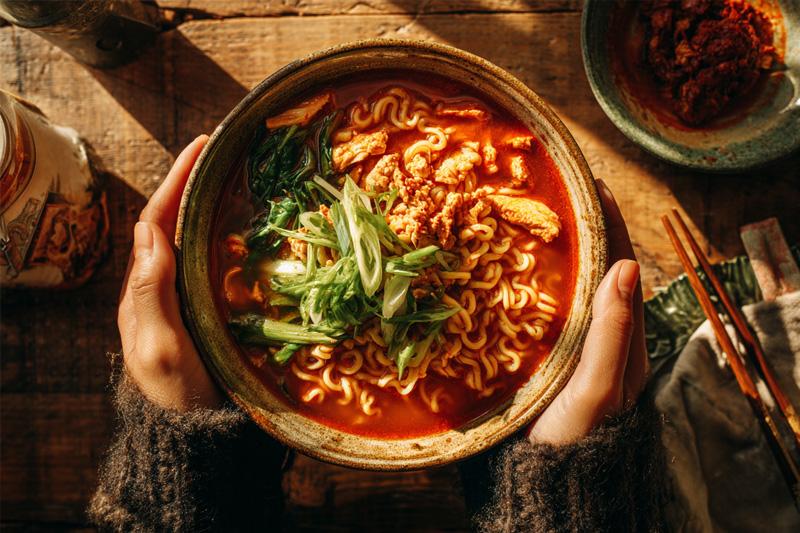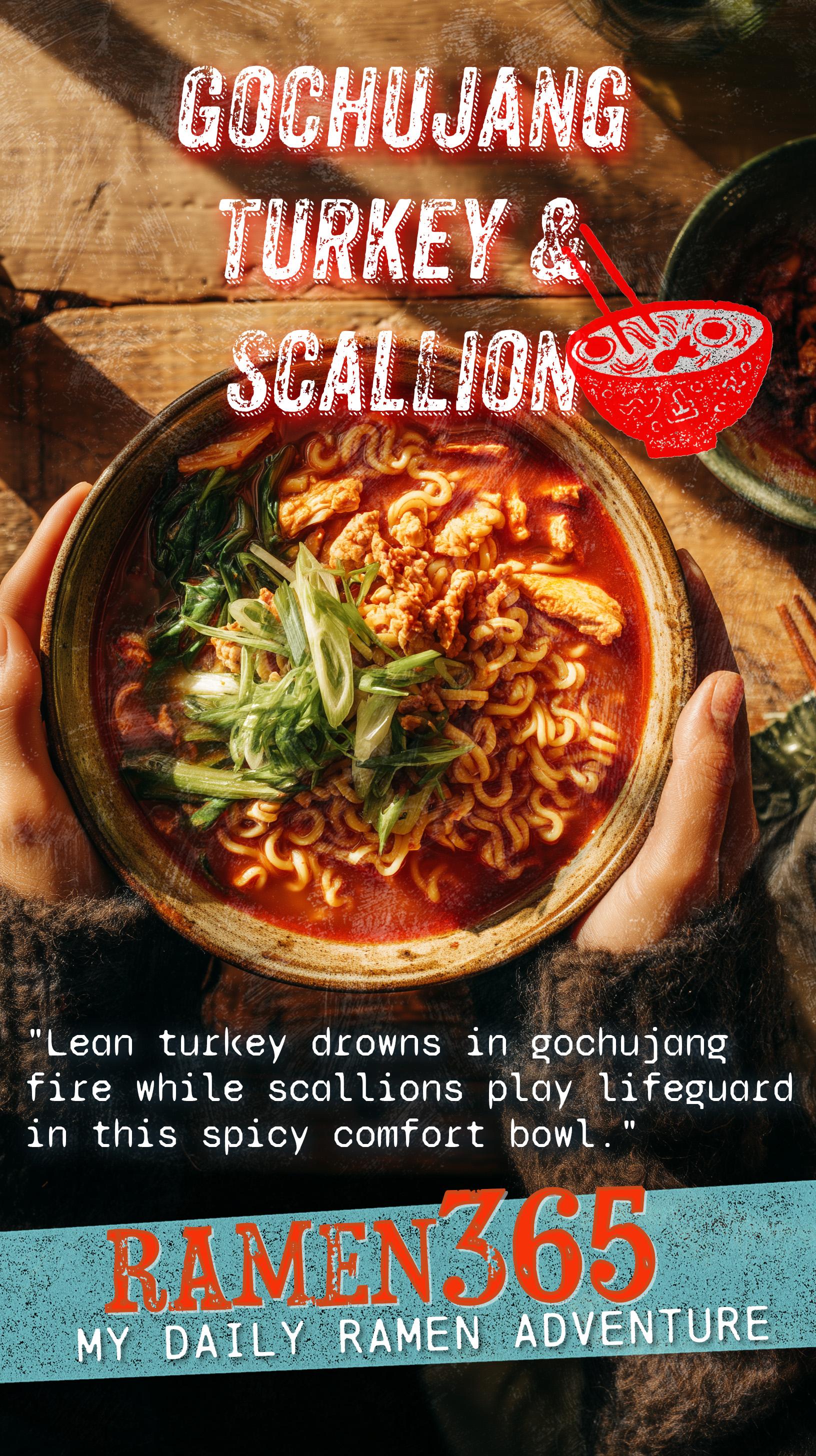Gochujang Turkey & Scallion


Turkey gets a bad reputation for being the boring protein, the thing your health-conscious aunt serves with steamed vegetables while sighing about calories. But when you coat ground turkey in gochujang, that fermented Korean chili paste that tastes like spicy umami had a baby with garlic, suddenly turkey becomes interesting. The gochujang brings this deep, complex heat that builds slowly instead of punching you in the face, and the scallions cut through all that richness with their sharp, oniony freshness. This is the kind of bowl that makes you forget turkey is supposed to be the virtuous choice, the kind that has you reaching for seconds even though your lips are tingling and your nose is running a little. It is comfort food that happens to be relatively healthy, which feels like getting away with something you should not.
Red heat meets lean bird—scallions slice through the fire—comfort wears flannel.
Let Me Tell You...
The first time I tried gochujang was at this tiny Korean restaurant where the owner didn't speak much English and I didn't speak any Korean, so ordering involved a lot of pointing and hopeful nodding.
She brought me this bubbling stone pot filled with what looked like molten lava, bright red and terrifying, and I remember thinking I'd made a terrible mistake.
But that first bite changed everything.
The heat wasn't just heat, it had layers, this fermented funkiness underneath, sweetness from the rice, garlic that had mellowed into something almost caramelized.
I went back three times that week, each time pointing at the same dish, each time getting a knowing smile from the owner like she'd successfully converted another spice coward into a gochujang believer.
I started keeping gochujang in my fridge after that, the way some people keep hot sauce or ketchup, using it to rescue boring meals from their own blandness.
Ground turkey became my favorite vehicle because it soaks up flavors like a sponge, taking on that vibrant red color and spicy complexity without fighting back.
Turkey doesn't have the assertive fattiness of pork or beef, which means it lets the gochujang shine instead of competing with it.
When you simmer turkey in gochujang with some soy sauce, garlic, and ginger, it transforms from diet food into something you'd actually crave on a cold night when you need something warm and aggressive to shake off the day.
The scallion component isn't just garnish, it's structural to the whole bowl.
I use an almost obscene amount of scallions, slicing them thinly so they soften slightly in the hot broth but still maintain that sharp, fresh bite.
They provide relief from the heat, little green lifelines you grab between spoonfuls of spicy broth, and they add this oniony sweetness that rounds out all those aggressive flavors.
Some recipes treat scallions like an afterthought, a sprinkle of green for color, but in this bowl they're co-stars alongside the turkey, equally important to the final balance.
Now this has become my go-to weeknight dinner when I want something that feels indulgent but comes together in less time than it takes to watch a sitcom.
There's something deeply satisfying about making food that looks impressive and tastes complex but actually requires minimal skill and even less cleanup.
Every time I make this, I think about that Korean restaurant owner and her knowing smile, how she understood that once you taste real gochujang used properly, you're changed forever, spoiled for bland food, ruined in the best possible way.
Ingredients
- 8 ounces dried ramen noodles (2 bricks, seasoning packets discarded)
- 1 pound ground turkey (preferably 93% lean)
- 3 tablespoons gochujang (Korean fermented chili paste)
- 2 tablespoons neutral oil (canola or vegetable)
- 4 cups low-sodium chicken stock
- 2 tablespoons soy sauce
- 1 tablespoon rice vinegar
- 1 tablespoon brown sugar
- 4 cloves garlic, minced
- 1 tablespoon fresh ginger, minced
- 6-8 scallions, thinly sliced (whites and greens separated)
- 1 tablespoon toasted sesame oil
- 1 teaspoon white sesame seeds, toasted
- Kosher salt and black pepper, to taste
- 1 teaspoon gochugaru (Korean chili flakes), optional for extra heat
Preparation
- Bring a large pot of water to a boil for the noodles. In a separate large pot or deep skillet, heat the neutral oil over medium-high heat.
- Add the ground turkey to the hot oil, breaking it apart with a wooden spoon. Season with a pinch of salt and black pepper. Cook for 5-6 minutes, stirring occasionally, until the turkey is browned and mostly cooked through.
- Push the turkey to the sides of the pot. Add the gochujang to the center and let it sizzle in the oil for 30-45 seconds to bloom its flavors.
- Add the minced garlic, ginger, and scallion whites to the pot. Stir everything together and cook for 1-2 minutes until fragrant.
- Pour in the chicken stock, soy sauce, rice vinegar, and brown sugar. Stir well to combine, scraping up any browned bits from the bottom. Bring to a boil, then reduce heat and simmer for 8-10 minutes to let the flavors meld.
- Meanwhile, cook the ramen noodles in the boiling water according to package directions (usually 3-4 minutes). Drain and rinse briefly under cool water.
- Taste the broth and adjust seasoning with more salt, soy sauce, or gochujang if desired. If you want extra heat, stir in the gochugaru.
- Divide the cooked noodles among serving bowls. Ladle the hot gochujang turkey broth over the noodles, ensuring each bowl gets plenty of turkey.
- Top generously with scallion greens, drizzle with toasted sesame oil, and sprinkle with toasted sesame seeds.
- Serve immediately while hot, with any optional toppings on the side.